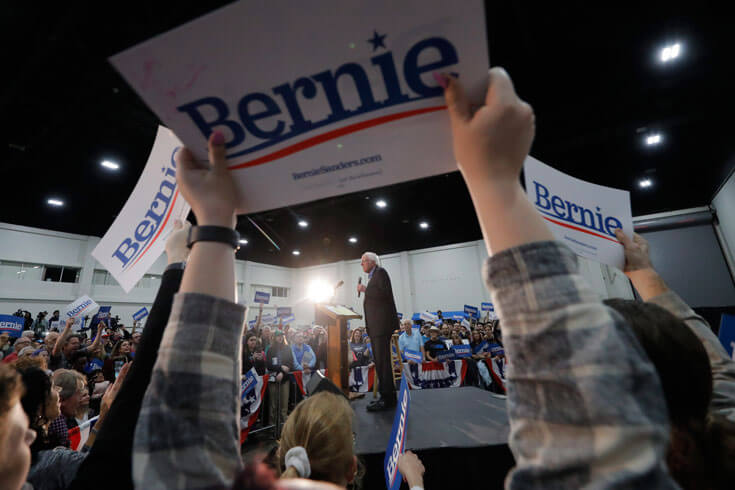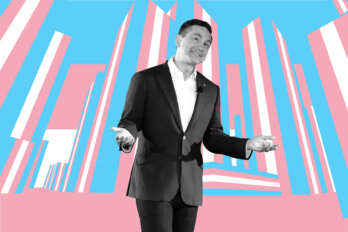“Never seen this before,” the US border guard told us as our car idled at one of the Quebec–Vermont crossings.
We’d come prepared for this moment. In our bags, there were printed copies of the Federal Election Commission regulations, which grant “foreign nationals” the right to volunteer on campaigns in the United States.
The border guard flipped through our passports and glanced at each of our faces. “I didn’t know so many Canadians come down for a primary,” she said.
“A lot this year?” I asked from the backseat.
“Yup.” She handed back the passports and waved us through. “Good luck!”
Inside the car, everyone exhaled. We pointed ourselves in the direction of New Hampshire, turned up Billy Bragg on the stereo, and steeled ourselves for the next part of our trip: helping get Senator Bernie Sanders nominated as the next presidential candidate of the US Democratic Party.
It was our “Bernie Journey,” the official campaign name for out-of-staters travelling to the early primaries and caucuses that would set the tone of the leadership race. For a few long days in mid-February, we would slog through slush and slide over ice in the foggy eastern state, knocking on doors as part of a massive grassroots operation.
Why were we here? No one else was offering a convincing answer for how to turn the tide of right-wing ascendance in American politics. No one else was making the case not merely for tinkering with a rotten system but for an overhaul that would include major new universal social programs, a redistribution of America’s oligarchic wealth, and a civilizational mission to tackle the climate crisis. And no one else was making it clear that any politician with a hope in hell of implementing this agenda could not merely rely on the powers of the White House but would need to be backed up by a noisy movement outside Washington.
Like any group of nerdy left-wingers, we had already debated and discussed the most apt historical analogy for our effort: the Spanish Civil War, in the 1930s, when that country’s fate teetered between the global forces of reactionary fascism and social liberation. Back then, more than a thousand Canadians had been inspired to defend the beleaguered republic, just as the United States was now attracting droves of Canadian volunteers, albeit nonviolent ones.
It was hard to dispute that, if Sanders won the chance to take on President Donald Trump, the autumn US election would entail similar stakes: a crossroads between barbarism and socialism, but this time with planetary repercussions. If Trump triumphed again, the world, we believed, was assured more war, waves of emboldened racism, and escalating climate breakdown. But, if Trump could be defeated by Sanders, the United States might become a catalyst for change well beyond its borders.
The morning after, the nine of us who had made the trip from Montreal, Ottawa, and Halifax were eating breakfast and warming up by a fire in the living room of Tal and Heidi, our Bernie Journey hosts.
Their house, in Nelson, a small forested town, was among scores of organizing outposts that were part of a network of seventeen New Hampshire field offices run by more than 150 campaign staffers. A pine tree next to the fireplace, christened the “Bernie tree,” was weighed down with Christmas ornaments and political pamphlets. A basket spilled over with hand-warmer packs, stylus pens for cellphones, and surprisingly, golf balls—handy for door knocking while wearing gloves in minus-fifteen-degree weather.
Tal posed a time-honoured precanvassing motivator: he asked us all to name one thing that excited us about the prospect of a Bernie Sanders presidency. Michael, who had recently dropped out of university after being hit by a car a few months earlier, described the accident that gave him a concussion and a fractured rib. He wanted Americans to have the kind of health care he had received, free of charge, which Sanders’s Medicare for All would ensure. Maryse, a lawyer, was hopeful that Sanders might provide Canadian politics with a bold model for taking on the establishment. Jacob, a student and former page in the House of Commons, believed Sanders was the only candidate with a truly serious climate plan. Eddy, a junior analyst, saw him as a politician who had been on the “right side of history” for forty years. Stephanie, an Ottawa city councillor assistant, believed it was long past time for a socialist to occupy the White House.
Did we have any concerns about intervening in US political affairs? Tal asked. When I had first seen our friend Miles’s Facebook post inviting others to join him on the trip to New Hampshire, I was reminded of something author Arundhati Roy had once said. I quoted it aloud to the group.
“Some of you will think it bad manners for a person like me, officially entered in the Big Book of Modern Nations as an ‘Indian citizen,’ to come here and criticize the US government,” Roy had acknowledged in a 2003 New York speech. “But, when a country ceases to be merely a country and becomes an empire, then the scale of operations changes dramatically. So may I clarify that tonight I speak as a subject of the American empire?”
Everyone in the room nodded. No feature of the US empire implicated us more than the imposing obstacle it posed to global climate action. It is one of the largest carbon emitters, a major player in the expansion of fossil fuel extraction, and currently governed by a president who has torn up the 2015 Paris climate agreement, a pact that would have afforded a chance of international cooperation. The election of Bernie Sanders, on the other hand, promised a complete reversal.
Sanders is backing a Green New Deal that would devote an astounding $16.3 trillion to weaning the US economy off of fossil fuels, developing sustainable agriculture, building out public transit, and creating an estimated 20 million jobs. It was the best plan for meeting the terms of the landmark 2018 UN climate report, which concluded that keeping global warming to safe levels within the next decade required “rapid, far-reaching and unprecedented changes in all aspects of society.”
“Bernie offers the last, best chance of saving the planet,” Jacob said, a talking point he would repeat any chance he got over the course of our trip—at doorsteps, in convenience stores, and to grannies we encountered at Little Miss Sophie’s diner in Rochester.
What he said wasn’t really an exaggeration. If Sanders didn’t win the presidency, it was hard to imagine mounting the kind of ambitious policies, starting in the United States and then rippling across the world, that could stave off ecological catastrophe in the narrow window of time we had left. In this light, one could suggest it was dangerously bad manners to not try to influence the US election.
This was hardly a fringe perspective within Canada. These young activists may have had a higher level of commitment—taking vacation or unpaid time off from their jobs to canvass in New Hampshire—but they weren’t alone in their views. A 2016 poll found that, among respondents from nine countries, Canadians were the only ones who picked Bernie Sanders as their preferred US President. (A majority of respondents from Germany, France, Japan, and Australia went for Hillary Clinton.)
A big part of Sanders’s appeal in Canada lies in how he’s channelled anger at the establishment. “If there is going to be class warfare in this country,” he has repeated on the campaign trail and on social media, “it’s time that the working class of this country won that war.” Is it any wonder this dishevelled avatar of class animus has resonated in Canada when, according to a recent Ipsos poll, 67 percent of people here believe the “economy is rigged to advantage the rich and powerful”? Despite so many being entirely correct in this sentiment, it has found little reflection in the rhetoric or policies of their most obvious potential vehicle, the New Democratic Party.
Most of the young Canadians on our Bernie Journey had campaigned, without much excitement, for NDP candidates (with a rare exception being Ontario MPP Joel Harden, a fiery and energetic socialist who had endorsed the Leap Manifesto, the Canadian precursor to the Green New Deal). The NDP’s climate plan, for instance, involved $15 billion, piddling compared to the transformative plan Sanders envisioned. But, if they were hitting walls at home, these activists felt that, if they could help Sanders win abroad, his political model might gain undeniable validity and even unstoppable momentum at home in Canada.
The man opened his front door shirtless, cradling a baby in one arm. Michael and I were canvassing in the town of Antrim, within view of a large white clapboard Baptist church.
“For Bernie? Let me come outside.”
He had voted for Sanders in the 2016 Democratic primary but was wondering if, this year, the socialist label would hurt his chances.
“And I love his policies, like Medicare for All, but can it be done? I really don’t think so.”
“We’re from Canada, so we know it can,” we replied in unison.
He eyed us closely.
At door after door, we were a gentle counter-example to the battered political expectations Americans had long grown accustomed to. Frequently admitting we were Canadians, we made the case that more vibrant social programs, like health care, were entirely feasible and could be paid for simply by raising taxes on corporations and the wealthy. (Although, if Sanders’s Medicare for All is passed, it will provide coverage—including dental and vision care, prescription drugs, and rehabilitative services—that is far more comprehensive than what we currently have in Canada.)
Miles, the Ottawa municipal worker who had organized the Bernie Journey, had his own favourite follow-up to questions about health care at the doorstep. He told people that the American Medical Association, a powerful physician’s lobby group, had gone to Saskatchewan in the 1960s to spread disinformation and campaign against the implementation of Tommy Douglas’s universal health care proposal. “Now we’re here, returning the favour,” Miles would say.
Americans in New Hampshire might have been hearing such things a lot; I bumped into a great many Canadians canvassing in the state.
At the press table for a rally with Sanders on the weekend, a press officer mischievously smiled and told me her usual job was doing media relations for the Ottawa Senators. A young student from Calgary, whom I met in line, had never been involved in any activism in Canada but had been inspired to fly down to Iowa, then New Hampshire. And several more groups of Canadians had driven across the border through the largest blizzard of the winter to volunteer. (The Sanders campaign says it doesn’t keep data on how many Canadians have been involved.)
Back home in Canada, groups in several cities—I was able to confirm them in Montreal, Ottawa, Toronto, and Vancouver—were organizing phone and texting operations for Sanders. One friend had sent off more than 60,000 texts using technology that facilitates mass texting.
According to a phone-banking organizer in Toronto, there was one main reason why more Canadians weren’t getting involved: most of his friends simply didn’t know that it was legal.
In New Hampshire, Canadians were among the 14,000 volunteers knocking on doors. On the Saturday that we were there, the campaign visited 150,000 households, a staggering 25 percent of all residences in the entire state.
It was one sign of the grassroots enthusiasm behind Sanders, who has received donations from more than 1.5 million Americans, for an average contribution of $18. In visualizations done by the New York Times of each of the candidate’s fundraising last August, Sanders’s haul was so dominant in every part of the country that the outlet was forced to create a second map just to show what other candidates had raised.
It is illegal, however, for Canadians to donate to the campaign, and we are also forbidden from purchasing any merchandise. At a large rally in a Durham university hockey arena, we gazed longingly at Bernie T-shirts and posters stacked on the tables outside. We would have to settle for free buttons.
The lead singer on stage—a ball of energy, platinum hair, and emo pouts and scowls—had just destroyed my eardrums and was now exhorting the crowd to vote for Bernie Sanders the following day. As glam-rock band Sunflower Bean finished its set, the college arena continued filling up to near-maximum capacity. More than 7,000 cheering people were anticipating, by left-wing standards, a star-studded night: Cornel West, Cynthia Nixon, Nina Turner, Alexandria Ocasio-Cortez, and garage-rock sensation the Strokes.
I watched the proceedings from the media section, on the bleachers across from the stage, while my Canadian friends tried to make their way into the crowd at rink-level below. Banners featuring Bernie Sanders’s main campaign slogan—“Not me, us”—hung from every corner of the arena. The Jumbotron flashed a message—#BernieBeatsTrump—that canvassers had been instructed to drum home at the doors that week. In national polls, Sanders outperformed nearly all other Democratic candidates against the incumbent president. And this boisterous arena was yet another confirmation of the energy inspired by Sanders, the kind needed to get voters out in November.
I’ve been to electrifying rallies in my lifetime—joining in giant round dances during the Idle No More movement or listening to eloquent Quebec student-leaders speak to a crowd of tens of thousands—but I had never seen anything like this put on by an insurgent candidate for a political party.
Former state senator Nina Turner bounded up and down the stage in a cheetah-print dress, boosting “a champion who says they are going to war against white supremacy.” Philosopher Cornel West followed up with his signature oration, arms gesticulating about the “neo-fascist gangster in the White House.” The largest cheers I heard were reserved for Alexandria Ocasio-Cortez, who went through a list of reasons she supported Sanders. “Who stood up for women and gender nonconforming people’s right to choose in the 1990s, when it was unpopular? Bernie Sanders.”
These were personalities, but they weren’t practising the personality politics that had marked the US Democratic Party for a generation—a politics of procorporate policies with a shiny patina of social progressivism. The figures on stage were, instead, part of a presidential campaign being built on a multiracial, working-class coalition.
By the time Sanders reached the stage, the crowd buzzed with overstimulation. It hardly mattered that he was delivering the same message he had given all week. “We are a movement to create the economy and government that works for all of us, not just the 1 percent—one that stands up to Wall Street and their greed, stands up to the insurance and drug companies and fossil fuel industry, stands up to the military-industrial complex and their endless wars, stands up to the prison-industrial complex, and stands up to the whole damn 1 percent.”
The crowd roared its approval.
After he had been ignored or dismissed for most of the campaign, it was proving harder and harder to avoid the fact that Sanders had generated huge momentum behind this agenda. His primary opponents, the Democratic establishment, and the corporate media were now shifting toward full-fledged attacks: panicked slights by Hillary Clinton that “no one likes him,” the accusation—which Sanders vehemently denies—that he had told Elizabeth Warren a woman couldn’t become president (he says he even “deferred” to Warren in 2015 and only jumped into the 2016 race when she decided not to run), and concern-trolling about his electability from the likes of Republican David Frum. For Sanders, only a broad and energetic movement—with a candidate serving as mere organizer-in-chief—could generate a political revolution big enough to change life for the overwhelming majority of people. And, despite his establishment detractors, it seemed like that movement was coalescing.
Earlier that night, in a lineup outside that circled around the campus for more than a kilometre, we had been approached by a peppy man in his twenties passing out flyers for Democratic candidate Andrew Yang.
“Oh, we can’t vote,” we told him. “We’re just down from Canada to volunteer for Bernie.”
His arms fell to his side, and he immediately turned downcast.
“What chance do we have,” he sighed, “if Bernie is inspiring people to come from Canada?”




